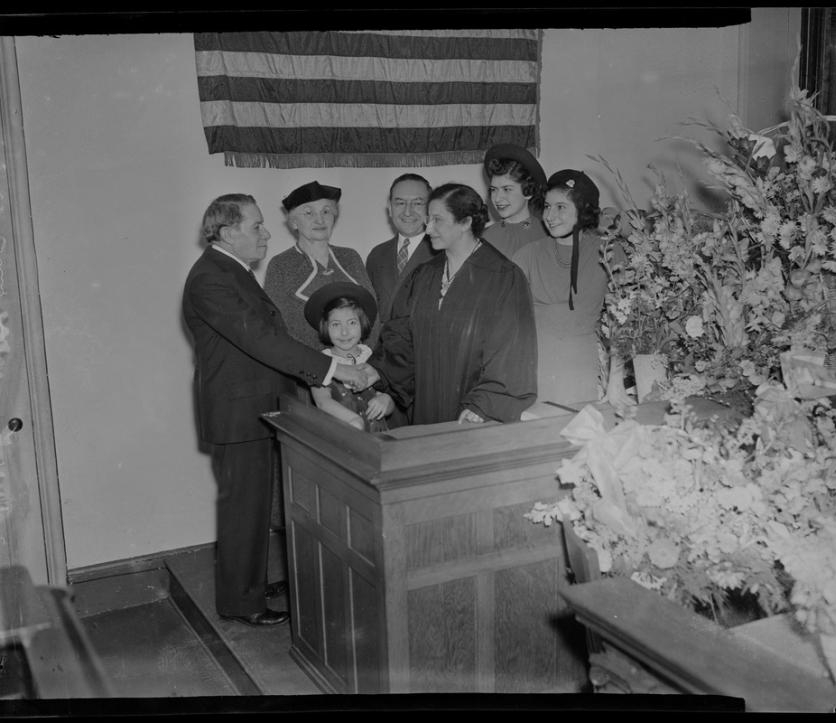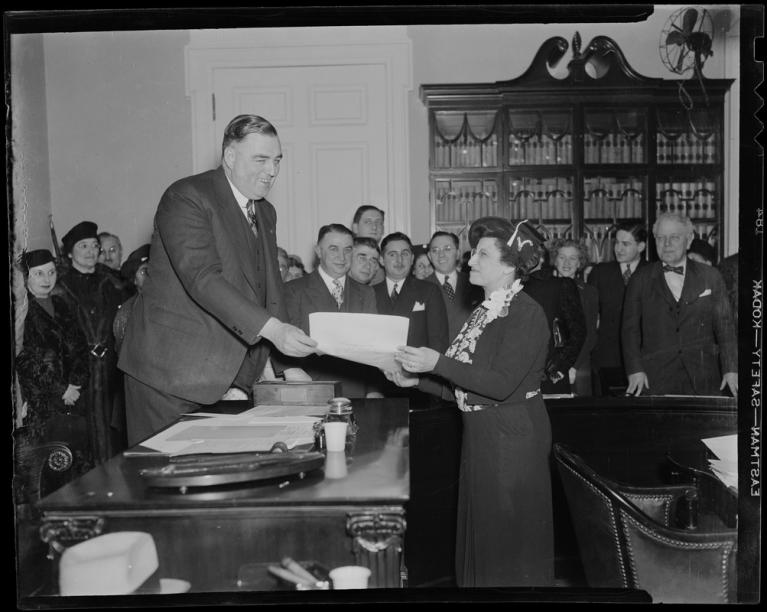Suffragist, Lawyer, Mother, Judge
by Katie Woods, Digital Public Historian
Finding fulfillment in both her professional and personal lives, Jennie Loitman Barron balanced her full-time career as a respected judge with her treasured roles of wife and mother.
Born on October 12, 1891, Jennie Loitman grew up in the West End neighborhood of Boston. Her parents, Fannie and Morris Loitman, were Russian-Jewish immigrants who worked as needle trades workers. The Loitmans were active in their community – Fannie could speak five languages and often served as an interpreter for new immigrants while Morris served as a charter member of the Hebrew Progressive Lodge.
Fannie and Morris instilled the value of education in Jennie and her three sisters. One of her mother’s lessons always stayed with her: “Money isn’t important. It can be lost or stolen. Learning is the thing that enriches your spirit – and that, no one can take from you.” Jennie took this to heart. She became valedictorian of Girls’ High School in Boston at age 15. She then attended Boston University, funding her schooling by selling copies of Shakespeare’s works, teaching citizenship classes at night, and working for the Women’s Educational and Industrial Union’s Department of Law. After completing her undergraduate degree, Jennie Loitman went on to obtain a Bachelor of Laws (LLB) and then a Master of Laws in 1914. In achieving these degrees, Loitman joined a small but growing group of women lawyers in the Commonwealth.
Loitman’s passion for women’s suffrage began while at Boston University. She established and served as first president of the school’s chapter of the College Equal Suffrage League. After graduation, Loitman continued her support for the movement. She became involved in local suffrage organizations, spoke at rallies, marched in parades, and went into local communities to advocate for women’s right to vote.
Admitted to the bar in 1914, Loitman set up her own practice. During this time, she remained active in the suffrage movement and launched a successful campaign for women to become notaries. In June 1918, she married her childhood sweetheart Samuel Barron, Jr., also an attorney. Together, they set up a law practice called Barron and Barron. They also had three daughters, Erma, Deborah, and Joy.
In her early years of motherhood, Jennie Loitman Barron continued to practice law as well as participate in the community. She served one term on the Boston School Committee (1926-1930), becoming the first woman to serve in decades as well as the first mother to ever serve on the committee. Barron also took on leadership roles in the League of Women Voters, advocating for women to serve on juries and equal guardianship rights for mothers.
In 1934, Barron was appointed an assistant attorney general of Massachusetts and part-time justice in the Norfolk District Court. As an assistant attorney general, she became the first woman to try a major criminal case in the Commonwealth. Just a few years later, Barron left her and her husband’s practice to serve as Associate Justice of the Boston Municipal Court in 1937, becoming the first woman to serve as a full-time justice in Massachusetts. After twenty years on the Municipal Court, Barron was selected as the first woman to serve on the Massachusetts Superior Court in 1959, a position she held until her death.
As a judge, Barron maintained a particular interest in cases relating to crime, juvenile delinquency, and domestic relations. She saw her courtroom as a clinic and believed reconciliation and rehabilitation should be at the center of the court system. Barron often considered innovative sentencing, such as community service or counseling with probation, rather than prison time. She saw her position of judge as:
...an opportunity to rehabilitate offenders, to reconcile families, to restore moral standards to society, that makes court work ever interesting…But it is all a challenge–to make our city, our country better, to promote human brotherhood, to be good citizens.
Her reputation as an empathetic “judge with a heart” gave her much respect. Barron often credited this compassion to her role as a mother. She believed that motherhood influenced her courtroom as much as the courtroom influenced her as a mother. Being a mother always remained important to her. Despite her busy schedule, Barron consistently made time for family, including hosting weekly Shabbat dinners.
Jennie Loitman Barron held numerous titles throughout her life. Professionally, she served as president of the Massachusetts Association of Women Lawyers and participated as the only woman US delegate in the first UN Conference on Crime and Juvenile Delinquency in 1955. She was also a pillar in the Jewish community, serving as first president of the New England Women’s Division of the American Jewish Congress, first president of Women’s Auxiliary of Beth Israel Hospital, and a national board member of Hadassah as well as the National Conference of Christian and Jews.
The honor Barron appeared to have treasured the most, though, was the title of “1959 National Mother of the Year,” by the American Mothers, Inc. Of this title, Barron said:
This is a tremendous honor. I am deeply touched. But I do not feel that this is given to me personally. Rather, it is a symbol of American motherhood and what it stands for. After all, the family is the essence of civilization. There is a tremendous responsibility, therefore, attached to this great honor that has come to me. I shall try to live up to it. I am very proud.”
After a lifetime dedicated to her family and community, Jennie Loitman Barron died on March 28, 1969.
Works Cited
Aliotta, Jilda M. “Barron, Jennie Loitman.” In American National Biography. Oxford University Press, February 2000. Accessed April 2024.
Hurt, Richard. “New Judge Often ‘First Woman To…’” Boston Globe, February 5, 1959.
“Jennie Loitman Barron.” Jewish Virtual Library. Accessed May 05, 2024.
“Judge Barron Takes Oath, Kisses Furcolo.” Boston Globe, February 13, 1959.
“Judge Gets Mother of the Year Award.” Boston Globe, May 06, 1959.
“Judge Jennie Loitman Barron Named American Mother of the Year.” Boston Globe, May 5, 1959.
Kaufman, Polly Welts. “Barron, Jennie Loitman.” in Notable American Women, Volume 4. Edited by Barbara Sicherman and Carol Hurd Green. Cambridge, MA: Belknap Press of Harvard University Press, 1980. 55-56.
“Only Woman Justice: Judge Barron, 77, Of Superior Court.” Boston Globe Obituaries, March 28, 1969.
Taitz, Emily. “Jennie Loitman Barron.” The Shalvi/Hyman Encyclopedia of Jewish Women, Jewish Women's Archives. Accessed May 05, 2024.
Additional Resources
Antler, Joyce. “‘American Mother of the Year’ Versus Monster Mothers.” In You Never Call! You Never Write! A History of the Jewish Mother. New York: Oxford University Press, 2007. 123-129.
Brody, Seymour. “Jennie Loitman Barron.” In Jewish Heroes & Heroines of America: 151 True Stories of Jewish American Heroism. Hollywood, Florida: Frederick Fell Publishers, 2003. 116-117.
“Jennie Loitman Barron.” Boston Women’s Heritage Trail. Accessed May 05, 2024.
“Papers of Jennie L. Barron, 1911-1969.” MC 410: M-134: T-102. Schlesinger Library, Radcliffe Institute, Harvard University.

